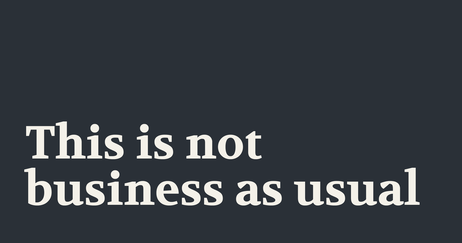|
I look around at what is happening in technology, communication and in business and see disruption in every sphere of work and life. I worry that our profession is not thinking about what we need to do to compete and survive in this rapidly and radically changing environment.
It’s like there is a bit of denial at play, a perception that all of this will not at some point profoundly impact us too. Much of the what I see in the market and development for assistants is “business as usual” and I want to raise the alarm and say that this is a dangerous path to take. If we remain complacent, we are facing serious challenges for the profession. It is estimated that 800 million people will lose their jobs to AI and robots. It is logical to assume it will impact us too. We must fundamentally rethink the role, its requirements and skill sets. I am not a futurist but from my own research and contact with senior leaders globally I think that we should start to focus on the following 5 criteria to future-proof our profession and to start preparing ourselves for what is to come. 1. Development If you are not developing your skills and elevating the potential value that you can have in your organisation you can very simply and efficiently be replaced with a cheaper option, human or otherwise. You need to ask: what are the problems I could solve? What knowledge do I need to acquire? Am I following industry publications for both the business as well as the EA profession? Am I using the documents that cross your desk daily and the meetings I attend to build your business acumen? Am I exploring a specialisation or a technical/industry specific competency? There is nothing wrong with traditional EA type training, but we also need to explore beyond this in intelligent ways to ensure that we expand our roles to fit our organisations and the future. My opinion is that we need to assemble short courses/certificates and create our own custom curriculum. Formal qualifications and even our school system is not really in a position to prepare us adequately for the future and the rate of change we are experiencing. I also want to note it here that development is not HR’s responsibility and there are tons of FREE online resources some from top international institutions like Stanford University. You only need to commit the time, so there is no excuse. And for those who turn down training or think they know it all, it is already too late. 2. Creativity and Innovation This is a valuable and sought-after ability in all companies today. Creativity is like a muscle and can be developed with practise and intent. I want to challenge you to look for opportunities to solve the problems in your teams/company and community. Listed below are some great tips I found on becoming more innovative from various sources: a. Just start. Keeping an idea in your mind doesn’t make it better or lead to a product. It’s not the idea that is valuable but the execution. b. Collaborate with others and share ideas. More people, equals more and better quality ideas. This has been proven by research. Cognitive diversity matters. If everyone agrees with you or has the same point of view/background/job/nationality/culture it is unlikely that you will come up with something truly creative and unique. c. Think in terms of options or possibilities, not problems. Be ok with failure. Ask questions like ‘what if’ and “yes, and…”. Creativity needs space and permission to be wrong, make mistakes and look stupid. If people don’t feel safe, they will not innovate. In the words of Elon Musk (probably one of the world’s most daring innovators) “Failure is an option here. If things are not failing, you are not innovating enough”. Perfectionism and caring about other people’s opinions of you is the enemy of innovation. d. Learn as you go along. Newsflash, no one else knows what they are doing either. It is ok to say “Yes” and then figure it out. e. Focus on visual elements and information. 40% of your brain’s resources are utilised for processing visual inputs. It’s a powerful tool so use it! Visual components often stimulate new and very exciting ideas. Most importantly visual inputs do not need language so immediately put another part of your brain to use. f. Break the frame of the problem. Take the issue out of its context, see it another way. This will create fresh ideas and new connections. Change your perception physically and emotionally. I want to HIGHLY recommend the book Non-Bullshit Innovation by David Rowan and his various YouTube videos to you and your teams as a brilliant starting point with amazing case studies. 3. Humanity This is about empathy, service and love. This is the work that is sorely needed in the world today and something Alexa cannot do. What can you bring to your team to help with engagement and morale? How can you provide a superior customer experience? In a world with a lot of competition and similar products, customer service is a major differentiator and valued, it’s premium work. 4. Role expansion Our roles will have to change and evolve. Are you keeping an eye on what your team and companies changing requirements are? Your job description and role should not be the limit of what you are willing to do and achieve, because if it is, you will not be levelling up and staying relevant. BUT HERE IS THE FINE PRINT – I am not advising you to allow yourself to be abused or exploited. Yes, by all means deliver beyond your job spec and exceed expectations but know your worth, have the confidence to be assertive and get what you deserve for the value you deliver. You should be the CEO of your own company and sell skills and time to your employer. Always be on the look-out for new “products” and “services” you can sell to your “client”. 5. Attitude I truly believe that the right attitude is the first and main requirement for this role. All the skills can be taught if the person is positive, diligent and concern about the quality of work they deliver. Be a life-long learner and have a growth mindset. Develop resilience and the ability to deal with and dissipate stress for yourself and your manager. If Uber was the great disruptor for transportation and Netflix for entertainment, what will be our big disruptor? One thing I can tell you is that I don’t believe it will be Alexa. What worries me is that we are not thinking about it, we are not trying to prepare for it or actively create ,it but it is inevitable…
1 Comment
|
EASIER TO ACCESSArchives
November 2023
Categories |


 RSS Feed
RSS Feed